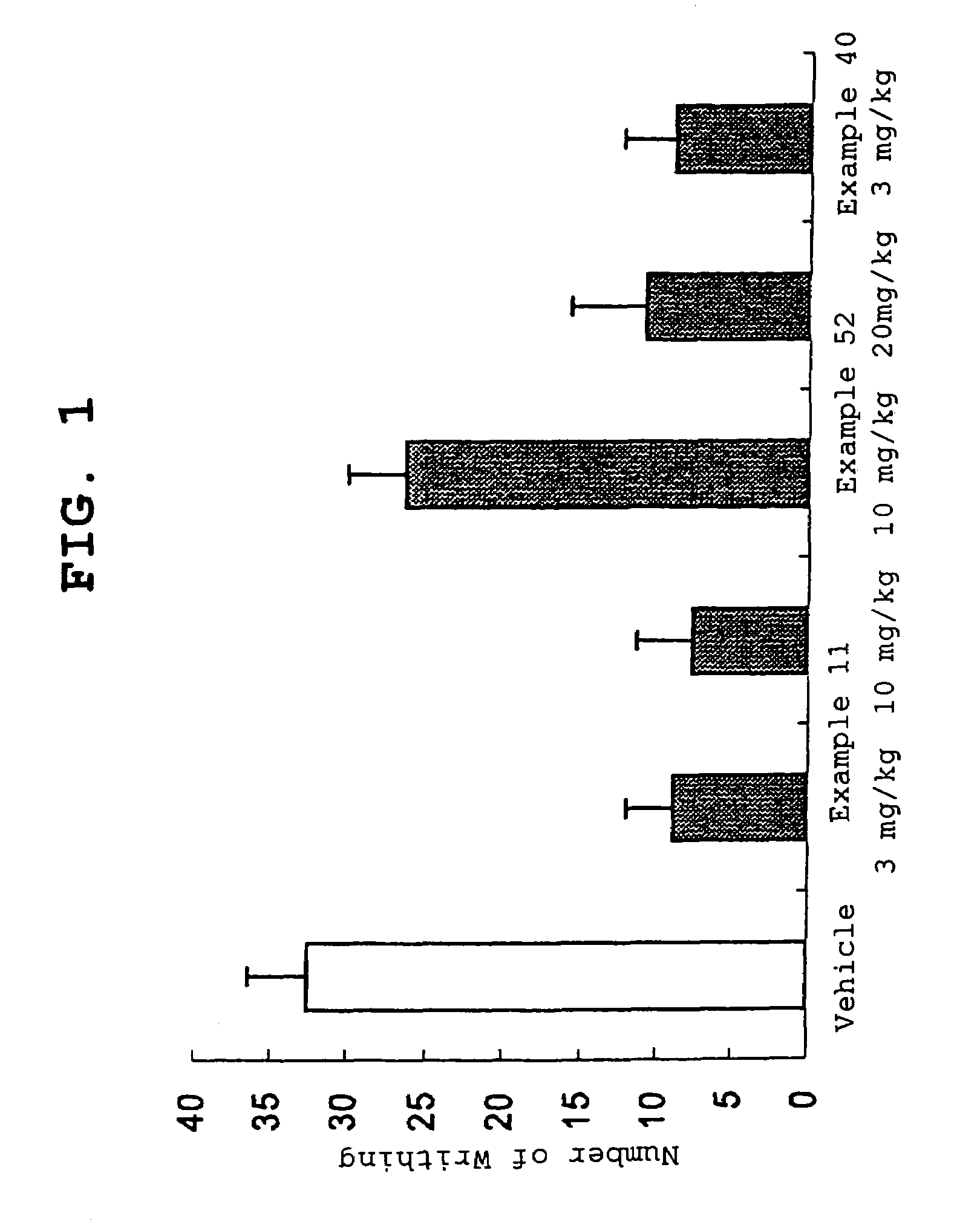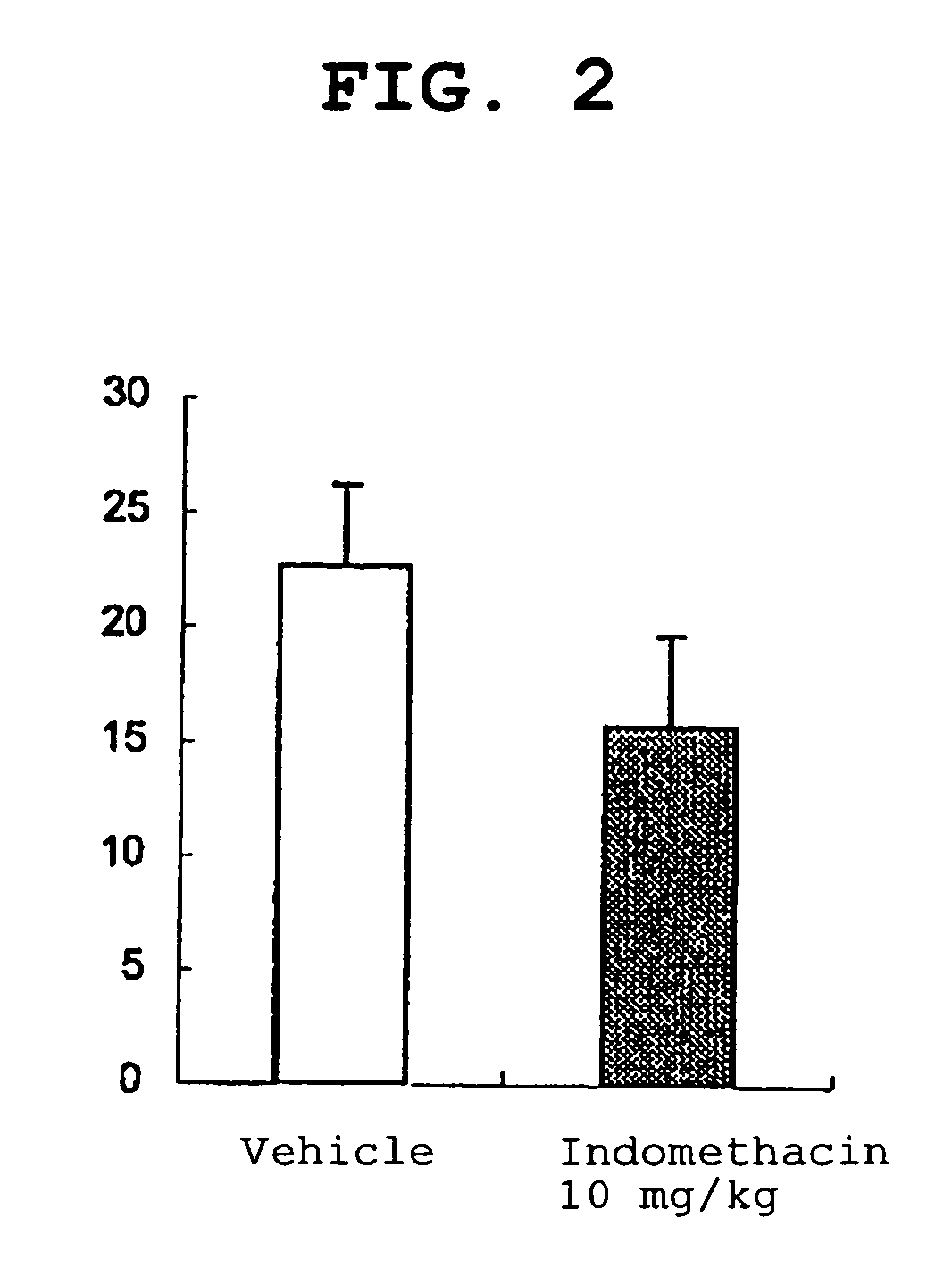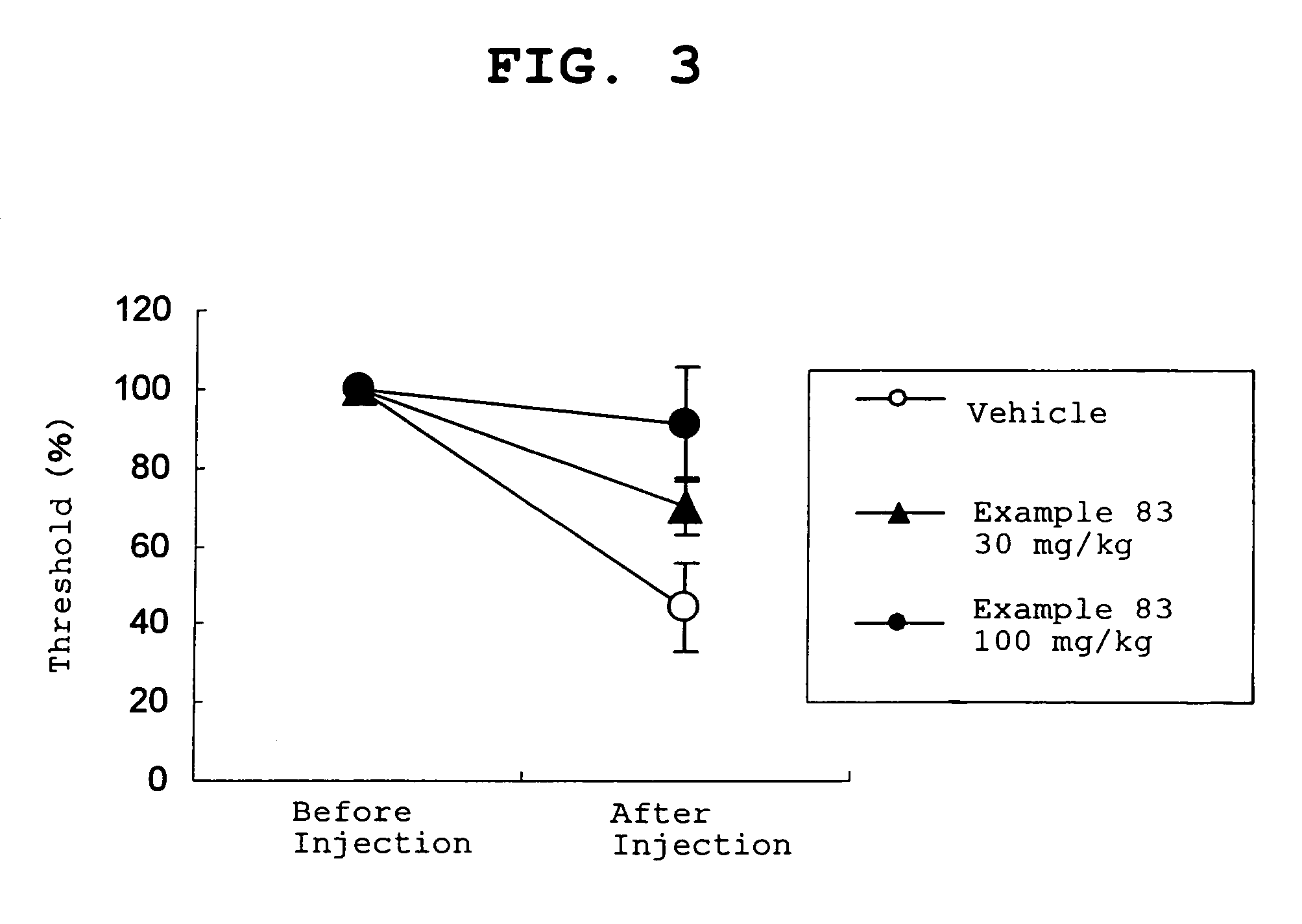Amide derivative
a technology of amide and derivatives, applied in the field of amide derivatives, can solve the problems of limited use, low action level, and possible side effects, and achieve the effect of superior anti-inflammatory activity
- Summary
- Abstract
- Description
- Claims
- Application Information
AI Technical Summary
Benefits of technology
Problems solved by technology
Method used
Image
Examples
example 1
Synthesis of 3′-trifluoromethyl-3,4,5,6-tetrahydro-2H-[1,2′]-bipyridinyl-4-carboxylic acid (4-isopropylphenyl)amide.
Step 1: 3′-trifluoromethyl-3,4,5,6-tetrahydro-2H-[1,2′]-bipyridinyl-4-carboxylic acid ethyl ester
[0168]Dimethylformamide (100 ml) was added to 2-chloro-3-trifluoromethylpyridine (2 g, 11 mmol), ethyl isonipecotate (2 g, 12.7 mmol), and potassium carbonate (2.6 g, 18.8 mmol), and the mixture was stirred overnight at 100° C. Using ethyl acetate as an extraction solvent, the mixture was treated by a conventional method to give a crude product, which was then purified by silica gel column chromatography to give an ester intermediate (1.17 g, 3.9 mmol).
Step 2: 3′-trifluoromethyl-3,4,5,6-tetrahydro-2H-[1,2′]-bipyridinyl-4-carboxylic acid
[0169]The ester intermediate (1.17 g, 3.9 mmol) obtained in Step 1 was dissolved in concentrated hydrochloric acid (10 ml) and dioxane (10 ml). The mixture was stirred at 60° C. for 4 hours, and the solvent was evaporated to give a carboxylic...
examples 2-51
[0171]The compounds of Examples 2-51 shown in Tables 1-6 were synthesized in the same manner as in the Steps of Example 1 and using the corresponding amine instead of 4-isopropylaniline of Example 1, Step 3. It is possible to synthesize a pyridinepiperidinecarboxylic acid derivative by variously modifying the pyridine derivative and piperidine derivative in Step 1, Example 1. The final compound was purified by silica gel chromatography (hexane-ethyl acetate) or reversed phase high performance liquid chromatography (reversed phase HPLC) (water-acetonitrile, each containing 0.1% trifluoroacetic acid (TFA)).
[0172]
TABLE 1ExR[M + H]+NMR 14-iPr392d1H-NMR (300 MHz, DMSO-d6) δ 1.14(3H, s), 1.16(3H, s),1.67-1.81(4H, m), 2.46-2.56(1H, m), 2.75-2.98(3H, m),3.47-3.59(2H, m), 7.13(2H, d), 7.18(1H, d), 7.49(2H, d),8.03(1H, d), 8.51(1H, d), 9.83(1H, s). 24-CF3418d1H-NMR (300 MHz, DMSO-d6) δ 1.63-1.98(4H, m),2.51-2.63(1H, m), 2.83-2.99(2H, m), 3.47-3.60(2H, m),7.16(1H, dd), 7.64(2H, d), 7.81(2H, d)...
example 52
Synthesis of N-(2-bromophenyl)-4-(ethyl-3-methylanilino)butanamide
Step 1: 4-(ethyl-3-methylanilino)butyric acid ethyl ester
[0178]4-Bromobutyric acid ethyl ester (17.1 ml), potassium carbonate (20.5 g), and DMF (80 ml) were added to N-ethyl-m-toluidine (8 g), and the mixture was stirred at 95° C. for 17 hours. The reaction mixture was diluted with ethyl acetate, washed with water, and dried over magnesium sulfate. The solvent was evaporated, and the residue was purified by silica gel chromatography (hexane-ethyl acetate) to give the title compound (14.1 g).
[0179]MS (ESI) m / z: 250 (M+H)+; 1H-NMR (300 MHz, CDCl3) δ 1.14 (3H, t), 1.26 (3H, t), 1.91 (2H, m), 2.27-2.37 (5H, m), 3.26-3.38 (4H, m), 4.14 (2H, q), 6.47-6.53 (3H, m), 7.07-7.12 (1H, m).
Step 2: 4-(ethyl-3-methylanilino)butyric acid
[0180]4N Solution (100 ml) of hydrogen chloride in dioxane and water (20 ml) was added to the compound (14.1 g) obtained in Step 1, and the mixture was stirred at 95° C. for 12 hours. The solvent was e...
PUM
 Login to View More
Login to View More Abstract
Description
Claims
Application Information
 Login to View More
Login to View More - R&D
- Intellectual Property
- Life Sciences
- Materials
- Tech Scout
- Unparalleled Data Quality
- Higher Quality Content
- 60% Fewer Hallucinations
Browse by: Latest US Patents, China's latest patents, Technical Efficacy Thesaurus, Application Domain, Technology Topic, Popular Technical Reports.
© 2025 PatSnap. All rights reserved.Legal|Privacy policy|Modern Slavery Act Transparency Statement|Sitemap|About US| Contact US: help@patsnap.com



